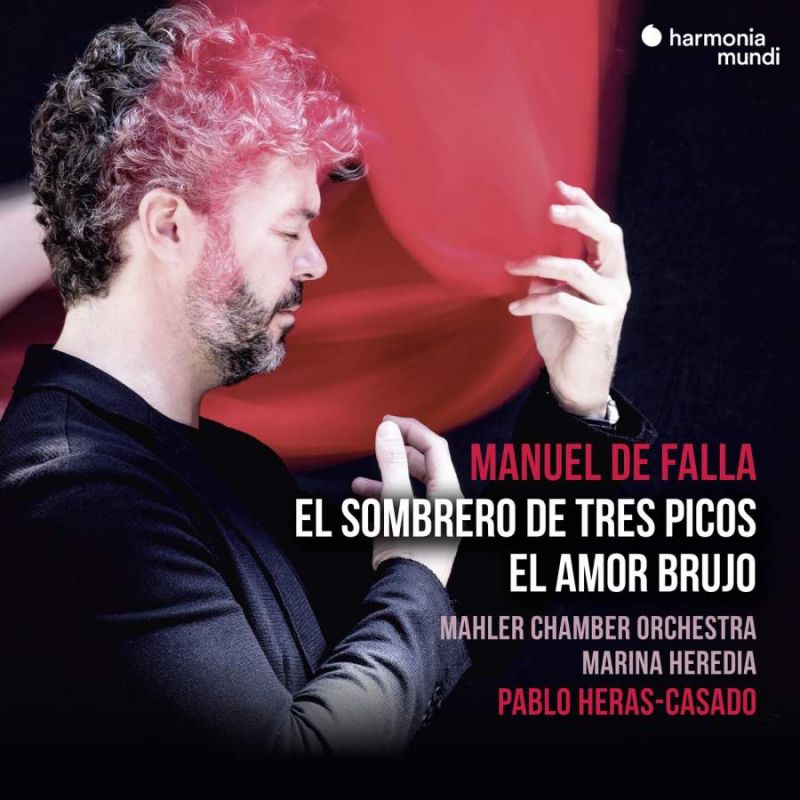FALLA El Sombrero de Tres Picos. El Amor Brujo (Heras-Casado)
View record and artist detailsRecord and Artist Details
Composer or Director: Manuel de Falla
Genre:
Orchestral
Label: Harmonia Mundi
Magazine Review Date: 11/2019
Media Format: CD or Download
Media Runtime: 62
Mastering:
DDD
Catalogue Number: HMM90 2271

Tracks:
| Composition | Artist Credit |
|---|---|
| (El) Sombrero de tres picos, 'Three-cornered Hat' |
Manuel de Falla, Composer
Mahler Chamber Orchestra Manuel de Falla, Composer Pablo Heras-Casado, Conductor |
| (El) Amor Brujo |
Manuel de Falla, Composer
Mahler Chamber Orchestra Manuel de Falla, Composer Pablo Heras-Casado, Conductor |
Author: Tim Ashley
He gives us a high-voltage interpretation, rich in detail, and strong on dramatic and narrative momentum. Rhythms are wonderfully precise, textures very sensuous throughout, the latter helped immeasurably by the vivid, immediate recording, though it also catches the occasional in-breath from Heras-Casado in moments of excitement. The fanfares and shouts of ‘¡Olé!’ that form the effective prelude set the tone with their energy and panache. The big set pieces – the Miller’s Farruca, his Wife’s Fandango – have tremendous fire, and the elation of the final Jota is irresistible, though equally striking is Heras-Casado’s relaxed treatment of the Seguidillas at the start of scene 2, when the Corregidor is out of the way and danger temporarily averted. It’s a superb achievement that more than holds its own beside the versions by Frühbeck de Burgos and Dutoit, both widely regarded as benchmarks.
Heras-Casado’s interpretation of E Amor brujo, in contrast, is comparatively reflective, if at times remarkably intense – closer, perhaps, to Giulini’s reined-in approach than to Dutoit’s more extrovert flamboyance. We’re more overtly aware of Falla’s Russian and French influences here, both in the brooding echoes of the opening of Firebird in the evocation of the Gypsy encampment near the start, and the swaying, Ravelian Pantomima, where the MCO strings sound very sensual and the mood is seductive in the extreme. There’s bravura playing in the Ritual Fire Dance, which is pungent, weighty and rather sinister, though Heras-Casado firmly places the emotional climax at the end, as the Dance of the Game of Love and subsequent sunrise chase the phantoms and terrors of night away. His flamenco singer is Marina Heredia, her voice raspy, lived-in and knowing, her way with the text impeccable. Some might still prefer Dutoit’s greater bravado in this work but Heras-Casado, nevertheless, gives us another outstanding performance that ranks among the best.
Discover the world's largest classical music catalogue with Presto Music.

Gramophone Digital Club
- Digital Edition
- Digital Archive
- Reviews Database
- Full website access
From £8.75 / month
Subscribe
Gramophone Full Club
- Print Edition
- Digital Edition
- Digital Archive
- Reviews Database
- Full website access
From £11.00 / month
Subscribe
If you are a library, university or other organisation that would be interested in an institutional subscription to Gramophone please click here for further information.




